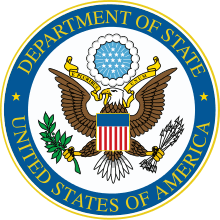Bureau of Conflict and Stabilization Operations
|
Seal of the United States Department of State | |
| Bureau overview | |
|---|---|
| Formed | November 22, 2011 |
| Preceding bureau | |
| Employees | 150 |
| Annual budget | $75 million |
| Bureau executive |
|
| Parent department | U.S. Department of State |
| Website |
www |
The Bureau of Conflict and Stabilization Operations (CSO) is a bureau of the United States Department of State. The Department of State announced the creation of the bureau on November 22, 2011, replacing the Office of the Coordinator for Reconstruction and Stabilization.
The bureau's mission is to advance U.S. national security by driving integrated, civilian-led efforts to prevent, respond to, and stabilize crises in priority states, setting conditions for long-term peace. The bureau emphasizes sustainable solutions guided by local dynamics and actors, and promotes unity of effort, the strategic use of scarce resources, and burden-sharing with international partners. This comprehensive approach will help the State Department anticipate and adapt to 21st century security challenges, while supporting America’s leadership in emerging crises.[1]
Function
The State Department’s Bureau of Conflict and Stabilization Operations (CSO) helps the Secretary of State improve the effectiveness and coherence of the U.S. government’s response to overseas crises.[2] Through an integrated approach between domestic employees, foreign service officers, a number of the State Department's regional and functional bureaus, additional departments and agencies within the US Government, and international partners, CSO addresses cycles of violence through locally grounded analysis and operational support in priority areas around the world.[3]
CSO has initiated a number of different programs in order to meet its goals in countries affected by conflict, including strategic communications campaigns, Interagency Conflict Assessment Frameworks (ICAF), election monitoring and observations, conducting conflict analysis, facilitating community dialogue.
Priority engagements
While CSO has worked in over 15 countries since its establishment, the majority of the bureau's efforts were initially focused in four specific countries: Burma, Honduras, Kenya, and Syria.[4] and expanded into Nigeria,[5][6] Bangladesh and the Middle East.[7] Under the current leadership of Asst Secretary David M. Robinson the portfolio continues to be dynamic.
Burma
In Burma, one of the last two countries still employing anti-personnel landmines, CSO is working with the government, ethnic minorities, and international partners to assist 5.2 million people living in landmine contaminated areas. These efforts aim to build confidence through mine risk education and support to survivors of landmines. Much of CSO's work in Burma is done in support of the US Embassy in Rangoon, the Bureau of East Asian and Pacific Affairs. Honduras
In Honduras, where homicide levels are the highest in the world outside of war zones, CSO is supporting Honduran efforts to reduce violence and address impunity through:
- Assistance for Honduran-created TV spots that show how citizens can help stem violence;
- Support for government and NGO efforts to reform the police and the attorney general’s office through confidence-building purges of corrupt officials and reform legislation;[8]
- Funding for a model community homicide-reduction initiative.[9]
Kenya
More than 1,000 people died and 350,000 people were displaced after the 2007 elections. In advance of the March 2013 elections, CSO integrated State Department efforts to help Kenyans prevent violence during the election and potential runoff. CSO staff assisted embassy efforts to build and focus Kenyan partnerships, particularly at the provincial and local levels. CSO supported existing local entities to organize nearly 50 Kenyans to establish a violence early-warning network in targeted hotspots.[10]
Syria
CSO is helping to deliver on the U.S. government’s commitment to provide non-lethal support to the Syrian opposition, including for the Syrian Opposition Coalition to assist local councils and civil society to provide essential services and to extend the rule of law and enhance stability inside liberated areas of Syria.[11]
In order to promote unity among the Syrian people and facilitate the political transition, CSO is programming nearly $27 million[12] in assistance to enable the opposition to build a communications infrastructure for improved internal and external communications networks and develop civilian leadership capacity.
Other engagements
The Bureau of Conflict and Stabilization Operations has additional countries that it works with in limited ways, primarily to support local peacebuilding efforts. Other places where the Bureau has had a presence are as follows:
- Afghanistan
- Bangladesh
- Belize
- Côte d'Ivoire
- Democratic Republic of the Congo
- Haiti
- Kosovo
- Kyrgyz Republic
- Libya
- Maldives
- Paraguay
- Senegal
- Sierra Leone
- South Sudan
- Timor-Leste
- Uganda
- Zimbabwe
See also
Bureau of Conflict and Stabilization Operations official website
References
- ↑ Department of State. "U.S. Department of State Launches Bureau of Conflict and Stabilization Operations". United States Department of State. Retrieved 7 December 2011.
- ↑ http://cco.ndu.edu/Portals/96/Documents/prism/prism_5-3/Golden_Opportunities_For_Civilian_Power.pdf
- ↑ CSO: One-Year Progress Report http://www.state.gov/documents/organization/206621.pdf
- ↑ http://www.state.gov/j/cso/where/index.htm
- ↑ http://www.state.gov/j/cso/releases/other/2014/218194.htm
- ↑ http://www.stakeholderdemocracy.org/anigerdeltalegacy/story-of-the-impact/dawn-in-the-creeks/
- ↑ http://www.state.gov/j/cso/releases/other/2014/219517.htm
- ↑ http://www.nytimes.com/2016/08/14/opinion/sunday/how-the-most-dangerous-place-on-earth-got-a-little-bit-safer.html
- ↑ http://www.state.gov/documents/organization/206621.pdf
- ↑ http://www.state.gov/j/cso/where/engagements/kenya/index.htm
- ↑ http://www.state.gov/j/cso/where/engagements/syria/index.htm
- ↑ http://www.state.gov/j/cso/where/engagements/syria/index.htm
